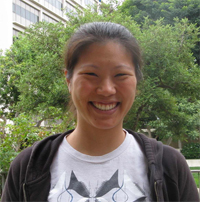Nucleic Acid Modifications by Schlafen Proteins
Elaine Kao
Appointment Period: 2010-2013, Grant Years: [26,27,28]
 The long-standing interest of the David lab has been theelucidation of the molecular events that facilitate the biological responseselicited by interferons such as antiviral and antiproliferative effects. Theseproperties of interferons account for their clinical use both in the directtreatment of cancer (e.g. melanoma, leukemia) as well as in the management ofviral infections associated with cancer etiology (e.g. HCV, HIV). Among thehighly IFNα/β-induced genes are members of a novel family of growthregulatory proteins termed "schlafen" (Slfn) which bear no resemblance to anyother known proteins or protein domains, yet their ectopic expression triggersan almost complete cell cycle arrest. Strikingly, nothing is known about theirmechanism of action.
The long-standing interest of the David lab has been theelucidation of the molecular events that facilitate the biological responseselicited by interferons such as antiviral and antiproliferative effects. Theseproperties of interferons account for their clinical use both in the directtreatment of cancer (e.g. melanoma, leukemia) as well as in the management ofviral infections associated with cancer etiology (e.g. HCV, HIV). Among thehighly IFNα/β-induced genes are members of a novel family of growthregulatory proteins termed "schlafen" (Slfn) which bear no resemblance to anyother known proteins or protein domains, yet their ectopic expression triggersan almost complete cell cycle arrest. Strikingly, nothing is known about theirmechanism of action.
Elaine's thesis project is the characterization of thebiological function and the molecular mechanism of Slfn proteins. While investigating thepossible effects of Slfn proteins on nucleic acids, Elaine discovered thatrecombinant purified Slfn is capable of altering the structure of DNA helices.In vivo, such variant DNA has been observed during events such asrecombination, dsDNA breaks and viral infections. The altered DNA sequencesoften co-localize with breakpoint hotspots in disease-related genes, such as inthe Alzheimer's specific genes, amlyoid precursor protein, Presenilin and ApoE,or to breakpoints in human translocation-related cancers (e.g. leukemias andlymphomas). Elaine's work describes the first protein capable of producing these structuralmodifications of DNA under physiological conditions.
PUBLICATIONS (resulting from this training)
Codonusage-based Inhibition of HIV Protein Synthesis by Human Schlafen 11. Manqing Li, Elaine Kao, Xia Gao, Hilary Sandig, Kirsten Limmer, Mariana Pavon, Sebastien Landry, Tao Pan, Matthew D. Weitzman & Michael David. Nature (2nd revision)
Other publications (prior to Training Grant appointment):
Onco-miR-155 targets SHIP1 to promote TNFα-dependent growth of Bcell lymphomas. I. Pedersen, D. Otero, E. Kao, A. Miletic, C.Hother, E. Ralfkiaer, R. Rickert, K. Gronbaek and M. David. EMBOMolecular Medicine, Vol. 1, No. 5 (2009), 288-95
 The long-standing interest of the David lab has been theelucidation of the molecular events that facilitate the biological responseselicited by interferons such as antiviral and antiproliferative effects. Theseproperties of interferons account for their clinical use both in the directtreatment of cancer (e.g. melanoma, leukemia) as well as in the management ofviral infections associated with cancer etiology (e.g. HCV, HIV). Among thehighly IFNα/β-induced genes are members of a novel family of growthregulatory proteins termed "schlafen" (Slfn) which bear no resemblance to anyother known proteins or protein domains, yet their ectopic expression triggersan almost complete cell cycle arrest. Strikingly, nothing is known about theirmechanism of action.
The long-standing interest of the David lab has been theelucidation of the molecular events that facilitate the biological responseselicited by interferons such as antiviral and antiproliferative effects. Theseproperties of interferons account for their clinical use both in the directtreatment of cancer (e.g. melanoma, leukemia) as well as in the management ofviral infections associated with cancer etiology (e.g. HCV, HIV). Among thehighly IFNα/β-induced genes are members of a novel family of growthregulatory proteins termed "schlafen" (Slfn) which bear no resemblance to anyother known proteins or protein domains, yet their ectopic expression triggersan almost complete cell cycle arrest. Strikingly, nothing is known about theirmechanism of action.